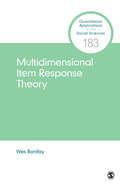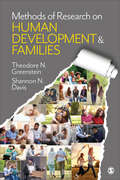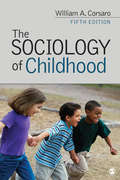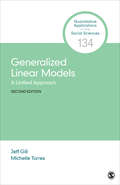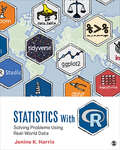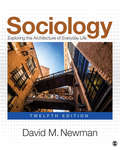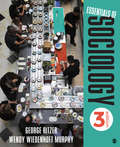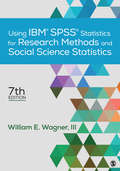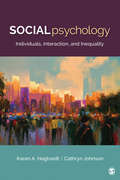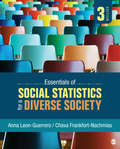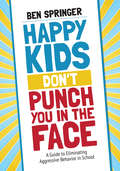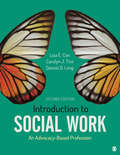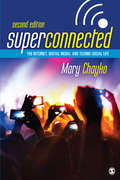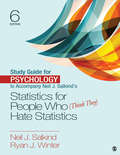- Table View
- List View
Multidimensional Item Response Theory (Quantitative Applications in the Social Sciences #183)
by Wes BonifaySeveral decades of psychometric research have led to the development of sophisticated models for multidimensional test data, and in recent years, multidimensional item response theory (MIRT) has become a burgeoning topic in psychological and educational measurement. Considered a cutting-edge statistical technique, the methodology underlying MIRT can be complex, and therefore doesn&’t receive much attention in introductory IRT courses. However author Wes Bonifay shows how MIRT can be understood and applied by anyone with a firm grounding in unidimensional IRT modeling. His volume includes practical examples and illustrations, along with numerous figures and diagrams. Multidimensional Item Response Theory includes snippets of R code interspersed throughout the text (with the complete R code included on an accompanying website) to guide readers in exploring MIRT models, estimating the model parameters, generating plots, and implementing the various procedures and applications discussed throughout the book.
Multidimensional Item Response Theory (Quantitative Applications in the Social Sciences #183)
by Wes BonifaySeveral decades of psychometric research have led to the development of sophisticated models for multidimensional test data, and in recent years, multidimensional item response theory (MIRT) has become a burgeoning topic in psychological and educational measurement. Considered a cutting-edge statistical technique, the methodology underlying MIRT can be complex, and therefore doesn&’t receive much attention in introductory IRT courses. However author Wes Bonifay shows how MIRT can be understood and applied by anyone with a firm grounding in unidimensional IRT modeling. His volume includes practical examples and illustrations, along with numerous figures and diagrams. Multidimensional Item Response Theory includes snippets of R code interspersed throughout the text (with the complete R code included on an accompanying website) to guide readers in exploring MIRT models, estimating the model parameters, generating plots, and implementing the various procedures and applications discussed throughout the book.
Methods of Research on Human Development and Families
by Shannon N. Davis Theodore N. GreensteinMethods of Research on Human Development and Families is an introduction to quantitative and qualitative research methods that teaches readers how to be intelligent and critical consumers of research on families. This new book has been adapted from the author team’s previous SAGE text, Methods of Family Research, and includes applications and examples from both family science and human development research. With a focus on interpreting and understanding research techniques rather than doing research, this text illustrates how research on families is conducted and helps students gain the competence and confidence to effectively read, interpret, and critique published research reports.
The Sociology of Childhood (Sociology for a New Century Series)
by William CorsaroWilliam A. Corsaro’s groundbreaking text, The Sociology of Childhood, discusses children and childhood from a sociological perspective. Corsaro provides in-depth coverage of the social theories of childhood, the peer cultures and social issues of children and youth, children and childhood within the frameworks of culture and history, and social problems and the future of childhood. The Fifth Edition has been thoroughly updated to incorporate the latest research and the most pertinent information so readers can engage in powerful discussions on a wide array of topics.
The Sociology of Childhood (Sociology for a New Century Series)
by William CorsaroWilliam A. Corsaro’s groundbreaking text, The Sociology of Childhood, discusses children and childhood from a sociological perspective. Corsaro provides in-depth coverage of the social theories of childhood, the peer cultures and social issues of children and youth, children and childhood within the frameworks of culture and history, and social problems and the future of childhood. The Fifth Edition has been thoroughly updated to incorporate the latest research and the most pertinent information so readers can engage in powerful discussions on a wide array of topics.
Generalized Linear Models: A Unified Approach (Quantitative Applications in the Social Sciences #134)
by Professor Jeff Gill Michelle TorresGeneralized Linear Models: A Unified Approach provides an introduction to and overview of GLMs, with each chapter carefully laying the groundwork for the next. Authors Jeff Gill and Michelle Torres provide examples using real data from multiple fields in the social sciences such as psychology, education, economics, and political science, including data on voting intentions in the 2016 U.S. Republican presidential primaries. The Second Edition also strengthens material on the exponential family form, including a new discussion on the multinomial distribution; adds more information on how to interpret results and make inferences in the chapter on estimation procedures; and has a new section on extensions to generalized linear models.
Generalized Linear Models: A Unified Approach (Quantitative Applications in the Social Sciences #134)
by Professor Jeff Gill Michelle TorresGeneralized Linear Models: A Unified Approach provides an introduction to and overview of GLMs, with each chapter carefully laying the groundwork for the next. Authors Jeff Gill and Michelle Torres provide examples using real data from multiple fields in the social sciences such as psychology, education, economics, and political science, including data on voting intentions in the 2016 U.S. Republican presidential primaries. The Second Edition also strengthens material on the exponential family form, including a new discussion on the multinomial distribution; adds more information on how to interpret results and make inferences in the chapter on estimation procedures; and has a new section on extensions to generalized linear models.
Statistics With R: Solving Problems Using Real-World Data
by Jenine K. HarrisDrawing on examples from across the social and behavioral sciences, Statistics with R: Solving Problems Using Real-World Data by Jenine K. Harris introduces foundational statistics concepts with beginner-friendly R programming in an exploration of the world&’s tricky problems faced by the &“R Team&” characters. Inspired by the programming group &“R Ladies,&” the R Team works together to master the skills of statistical analysis and data visualization to untangle real-world, messy data using R. The storylines draw students into investigating contemporary issues such as marijuana legalization, voter registration, and the opioid epidemic, and lead them step-by-step through full-color illustrations of R statistics and interactive exercises.
Statistics With R: Solving Problems Using Real-World Data
by Jenine K. HarrisDrawing on examples from across the social and behavioral sciences, Statistics with R: Solving Problems Using Real-World Data by Jenine K. Harris introduces foundational statistics concepts with beginner-friendly R programming in an exploration of the world&’s tricky problems faced by the &“R Team&” characters. Inspired by the programming group &“R Ladies,&” the R Team works together to master the skills of statistical analysis and data visualization to untangle real-world, messy data using R. The storylines draw students into investigating contemporary issues such as marijuana legalization, voter registration, and the opioid epidemic, and lead them step-by-step through full-color illustrations of R statistics and interactive exercises.
Sociology: Exploring the Architecture of Everyday Life
by Dr David M. NewmanIn Sociology: Exploring the Architecture of Everyday Life, David M. Newman shows students how to see the "unfamiliar in the familiar"—to step back and see organization and predictability in their take-for-granted personal experiences. With his approachable writing style and lively personal anecdotes, the author's goal from the first edition has always been the same: to write a textbook that, in his words, "reads like a real book." Newman uses the metaphors of "architecture" and "construction," to help students understand that society is not something that just exists "out there," independently of themselves; it is a human creation that is planned, maintained, or altered by individuals. Using vivid prose, examples from current events, and the latest research findings, this fully updated Twelfth Edition presents a unique and thought-provoking overview of how society is constructed and experienced. Instead of surveying every subfield in sociology, the more streamlined coverage focuses on the individual and society, the construction of self and society, and social inequality in the context of social structures.
Sociology: Exploring the Architecture of Everyday Life
by Dr David M. NewmanIn Sociology: Exploring the Architecture of Everyday Life, David M. Newman shows students how to see the "unfamiliar in the familiar"—to step back and see organization and predictability in their take-for-granted personal experiences. With his approachable writing style and lively personal anecdotes, the author's goal from the first edition has always been the same: to write a textbook that, in his words, "reads like a real book." Newman uses the metaphors of "architecture" and "construction," to help students understand that society is not something that just exists "out there," independently of themselves; it is a human creation that is planned, maintained, or altered by individuals. Using vivid prose, examples from current events, and the latest research findings, this fully updated Twelfth Edition presents a unique and thought-provoking overview of how society is constructed and experienced. Instead of surveying every subfield in sociology, the more streamlined coverage focuses on the individual and society, the construction of self and society, and social inequality in the context of social structures.
Essentials of Sociology
by Dr George Ritzer Dr Wendy A. Wiedenhoft MurphyEssentials of Sociology, adapted from George Ritzer’s Introduction to Sociology, provides the same rock-solid foundation from one of sociology's best-known thinkers in a shorter and more streamlined format. With new co-author Wendy Wiedenhoft Murphy, the Third Edition continues to illuminate traditional sociological concepts and theories and focuses on some of the most compelling features of contemporary social life: globalization, consumer culture, the internet, and the “McDonaldization” of society. New to this Edition New “Trending” boxes focus on influential books by sociologists that have become part of the public conversation about important issues. Replacing “Public Sociology” boxes, this feature demonstrates the diversity of sociology's practitioners, methods, and subject matter, featuring such authors as o Michelle Alexander (The New Jim Crow) o Elizabeth Armstrong and Laura Hamilton (Paying for the Party) o Matthew Desmond (Evicted) o Arlie Hochschild (Strangers in Their Own Land) o Eric Klinenberg (Going Solo) o C.J. Pascoe (Dude, You're a Fag) o Lori Peek and Alice Fothergill (Children of Katrina) o Allison Pugh (The Tumbleweed Society) Updated examples in the text and "Digital Living" boxes keep pace with changes in digital technology and online practices, including Uber, Bitcoin, net neutrality, digital privacy, WikiLeaks, and cyberactivism. New or updated subjects apply sociological thinking to the latest issues including: the 2016 U.S. election Brexit the global growth of ISIS climate change further segmentation of wealthy Americans as the "super rich" transgender people in the U.S. armed forces charter schools the legalization of marijuana the Flint water crisis fourth-wave feminism
Essentials of Sociology
by Dr George Ritzer Dr Wendy A. Wiedenhoft MurphyEssentials of Sociology, adapted from George Ritzer’s Introduction to Sociology, provides the same rock-solid foundation from one of sociology's best-known thinkers in a shorter and more streamlined format. With new co-author Wendy Wiedenhoft Murphy, the Third Edition continues to illuminate traditional sociological concepts and theories and focuses on some of the most compelling features of contemporary social life: globalization, consumer culture, the internet, and the “McDonaldization” of society. New to this Edition New “Trending” boxes focus on influential books by sociologists that have become part of the public conversation about important issues. Replacing “Public Sociology” boxes, this feature demonstrates the diversity of sociology's practitioners, methods, and subject matter, featuring such authors as o Michelle Alexander (The New Jim Crow) o Elizabeth Armstrong and Laura Hamilton (Paying for the Party) o Matthew Desmond (Evicted) o Arlie Hochschild (Strangers in Their Own Land) o Eric Klinenberg (Going Solo) o C.J. Pascoe (Dude, You're a Fag) o Lori Peek and Alice Fothergill (Children of Katrina) o Allison Pugh (The Tumbleweed Society) Updated examples in the text and "Digital Living" boxes keep pace with changes in digital technology and online practices, including Uber, Bitcoin, net neutrality, digital privacy, WikiLeaks, and cyberactivism. New or updated subjects apply sociological thinking to the latest issues including: the 2016 U.S. election Brexit the global growth of ISIS climate change further segmentation of wealthy Americans as the "super rich" transgender people in the U.S. armed forces charter schools the legalization of marijuana the Flint water crisis fourth-wave feminism
Using IBM® SPSS® Statistics for Research Methods and Social Science Statistics
by Dr. William E. WagnerUsing IBM SPSS for Social Statistics and Research Methods supports the use of SPSS for social statistics and research methods classes and is an excellent companion to any undergraduate statistics or research methods textbook. The book covers a wide range of data analysis topics to help students working on papers, research projects, and proposals. Using examples, tables, and actual SPSS screen captures, along with current data sets from the General Social Survey, it guides users through several different kinds of SPSS files including data files, output files, and syntax files.
Using IBM® SPSS® Statistics for Research Methods and Social Science Statistics
by Dr. William E. WagnerUsing IBM SPSS for Social Statistics and Research Methods supports the use of SPSS for social statistics and research methods classes and is an excellent companion to any undergraduate statistics or research methods textbook. The book covers a wide range of data analysis topics to help students working on papers, research projects, and proposals. Using examples, tables, and actual SPSS screen captures, along with current data sets from the General Social Survey, it guides users through several different kinds of SPSS files including data files, output files, and syntax files.
Social Psychology: Individuals, Interaction, and Inequality
by Karen A. Hegtvedt Cathryn J. JohnsonSocial Psychology takes a sociological approach to the study of the individual in relationship to society. It's main purpose is is to highlight how social psychology provides varied, yet inter-related, explanations for individuals’ experiences in groups. The text tells the story of how these dynamics unfold, beginning with the central social characteristics of the individual, to processes of perception and of interaction. In the telling of this story, it also notes some of the interesting cross-cultural comparisons in regard to these dynamics.
Methods of Research on Human Development and Families
by Shannon N. Davis Theodore N. GreensteinMethods of Research on Human Development and Families is an introduction to quantitative and qualitative research methods that teaches readers how to be intelligent and critical consumers of research on families. This new book has been adapted from the author team’s previous SAGE text, Methods of Family Research, and includes applications and examples from both family science and human development research. With a focus on interpreting and understanding research techniques rather than doing research, this text illustrates how research on families is conducted and helps students gain the competence and confidence to effectively read, interpret, and critique published research reports.
Essentials of Social Statistics for a Diverse Society
by Dr Anna Leon-Guerrero Dr Chava Frankfort-NachmiasEssentials of Social Statistics for a Diverse Society, Third Edition, is a more streamlined, less expensive version of the successful Social Statistics for a Diverse Society. It is distinct for the use of real data from contemporary social issues and for a strong emphasis on race, class, gender, and other statuses. With a wide range of examples and exercises taken from current events and published research, frequent illustrations, and a focus on student learning, this book continues to be an accessible and engaging resource for students.
Essentials of Social Statistics for a Diverse Society
by Dr Anna Leon-Guerrero Dr Chava Frankfort-NachmiasEssentials of Social Statistics for a Diverse Society, Third Edition, is a more streamlined, less expensive version of the successful Social Statistics for a Diverse Society. It is distinct for the use of real data from contemporary social issues and for a strong emphasis on race, class, gender, and other statuses. With a wide range of examples and exercises taken from current events and published research, frequent illustrations, and a focus on student learning, this book continues to be an accessible and engaging resource for students.
Happy Kids Don't Punch You in the Face: A Guide to Eliminating Aggressive Behavior in School
by Ben SpringerTake a positive approach to behavior intervention for results that work—and last! When there’s a nuclear meltdown happening in your classroom, this book is your trusted guide on what to do in the heat of the moment, and how you can prevent future incidents. These field-tested strategies integrate principles of behavioral intervention with the best practices of positive psychology. Inside you’ll find: Ready-to-use tools and guidelines Practical guidance developed from the author’s extensive experience training educators Solutions that work now and support each student’s future well-being A deliberate focus at the classroom, building, and system level
Happy Kids Don't Punch You in the Face: A Guide to Eliminating Aggressive Behavior in School
by Ben SpringerTake a positive approach to behavior intervention for results that work—and last! When there’s a nuclear meltdown happening in your classroom, this book is your trusted guide on what to do in the heat of the moment, and how you can prevent future incidents. These field-tested strategies integrate principles of behavioral intervention with the best practices of positive psychology. Inside you’ll find: Ready-to-use tools and guidelines Practical guidance developed from the author’s extensive experience training educators Solutions that work now and support each student’s future well-being A deliberate focus at the classroom, building, and system level
Introduction to Social Work: An Advocacy-Based Profession (Social Work in the New Century)
by Carolyn J. Tice Dennis D. Long Lisa E. Cox<p>The best-selling <i>Introduction to Social Work</i> by Lisa E. Cox, Carolyn J. Tice, and Dennis D. Long takes students to the root of the social work profession by covering its history, practice settings, and career paths within a unique advocacy framework. This advocacy practice and policy model comprised of four components—economic and social justice, a supportive environment, human needs and rights, and political access—provides an effective lens for viewing today’s social issues. Throughout the book, an emphasis on advocacy underscores the transformative opportunities and contributions of social work on not just the clinical/client level, but also at organizational, community, national, and international levels. <p>The Second Edition closely aligns with the latest Educational Policy and Accreditation Standards (EPAS) from the Council on Social Work Education (CSWE) and references the 2018 Code of Ethics from the National Association of Social Workers (NASW). Through the authors’ inclusion of reflective practice, students will be encouraged to engage in critical thought and contemplate a career in social work.</p>
Superconnected: The Internet, Digital Media, And Techno-social Life (Sage Sociological Essentials Ser.)
by Mary ChaykoSuperconnected: The Internet, Digital Media, and Techno-Social Life, Second Edition brings together the latest research from many relevant fields to examine how contemporary social life is mediated by various digital technologies: the internet, social media, and mobile devices. The book explores such topics as how digital technology led to the modern information age, information sharing and surveillance, how digital media shape socialization and development of the self, digital divides that separate groups in society, and the impact of digital media across social institutions. The author’s clear, nontechnical discussions and interdisciplinary synthesis make Superconnected an essential text for any course that examines how social life is affected when information and communication technology enter the picture. Dr. Mary Chayko is a sociologist, Teaching Professor of Communication and Information, and Director of Undergraduate Interdisciplinary Studies at the School of Communication and Information (SC&I) at Rutgers University. For more on the author and for instructor resources, visit her book blog at http://superconnectedblog.com. New to the Edition Current events, the latest statistics and new research findings are reflected throughout the book, including richly-detailed sections on the rise of “fake” news and information, the human-machine relationship, and the history and implications of the “dark web” and the “deep web.” The book’s companion blog, superconnectedblog.com, now includes customizable lecture slides and discussion questions for each chapter. Short podcasts, recorded by the author and posted to her blog, provide fun, unique points of access to every chapter.
Superconnected: The Internet, Digital Media, And Techno-social Life (Sage Sociological Essentials Ser.)
by Mary ChaykoSuperconnected: The Internet, Digital Media, and Techno-Social Life, Second Edition brings together the latest research from many relevant fields to examine how contemporary social life is mediated by various digital technologies: the internet, social media, and mobile devices. The book explores such topics as how digital technology led to the modern information age, information sharing and surveillance, how digital media shape socialization and development of the self, digital divides that separate groups in society, and the impact of digital media across social institutions. The author’s clear, nontechnical discussions and interdisciplinary synthesis make Superconnected an essential text for any course that examines how social life is affected when information and communication technology enter the picture. Dr. Mary Chayko is a sociologist, Teaching Professor of Communication and Information, and Director of Undergraduate Interdisciplinary Studies at the School of Communication and Information (SC&I) at Rutgers University. For more on the author and for instructor resources, visit her book blog at http://superconnectedblog.com. New to the Edition Current events, the latest statistics and new research findings are reflected throughout the book, including richly-detailed sections on the rise of “fake” news and information, the human-machine relationship, and the history and implications of the “dark web” and the “deep web.” The book’s companion blog, superconnectedblog.com, now includes customizable lecture slides and discussion questions for each chapter. Short podcasts, recorded by the author and posted to her blog, provide fun, unique points of access to every chapter.
Study Guide for Psychology to Accompany Neil J. Salkind's Statistics for People Who (Think They) Hate Statistics
by Dr Neil J. Salkind Ryan J. WinterThis Study Guide for introductory statistics courses in psychology departments is designed to accompany Neil J. Salkind’s best-selling Statistics for People Who (Think They) Hate Statistics, Sixth Edition. Extra exercises; activities; and true/false, multiple choice, and essay questions (with answers to all questions) feature psychology-specific content to help further student mastery of text concepts. Two additional appendix items in this guide include: Practice with Real Data!, which outlines four experiments and provides students with the datasets (at edge.sagepub.com/salkind6e) to run the analyses, plus Writing Up Your Results – Guidelines based on APA style.
